План-конспект урока в 9 классе
Бандеко А.Г.
"Викторианский период"(работа с текстом)
| Этап урока | Ход урока | Предполагаемое время |
| 1. Фонетическая разминка | 1 . Приветствие.. Good morning, students. How are you today? 2. Молитва | 2 минуты |
| 2. Постановка цели урока | At home you have read a text. What was the text about? In our lesson we are going to make a plan of this text for your retelling. Let's start. At first I want you to listen to me and repeat after me some new words from this text.
Повторение слов из текста (работа хором) | домашнее хозяйство - household постоянный,неизменный - permanent торжественный - solemn, печально известный- notorious, викторианский период - Victorian's period , кормилец- breadwinner средний (возраст) средний класс- middle age ,(class) авторитетный, респектабельный -respectable. было запрещено - was forbidden, развлечения- entertainment, amusement слуги - sevants, члены семьи- members of family |
|
|
1 минута |
| 3. Проверка домашнего задания (чтение текста, составление плана по ключевым словам) | Task 1 Well done. Now I want you to translate some my words from Russian into English. You can use the text. Read only the necessary word. Do you understand the task? - Yes./No. Let's translate it. |
отмечен большими переменами рост промышленности и торговли расширение и усиление Британской империи пропасть между богатыми и бедными строгая мораль браки отличались постоянством образ жизни довольствоваться немногими удовольствиями борода или бакенбарды разрезал на отдельные порции кусок мяса пока с ними не заговорит взрослый держала в порядке приспособления кружевной чепчик читал молитву для всей семьи книжки-раскраски публичные чтения и декламация
торжественный день
жмурки сокровище
|
1. is marked by great change; 2. the growth in industry and trade; 3. the development of the British Empire; 4. the gulf between the rich and the poor; 5. strict moral standards; 6. marriages were always permanent; 7. way of life; 8. to be satisfied with few pleasures; 9. beard or side-whiskers; 10. carved the joint of meat;
11. unless spoken to by a grown-up; 12. kept in order; 13. gadgets; 14. a lace cap; 15. took family prayers; 16. picture books; 17. public readings and recitations; 18. a very solemn day; 19. blind man’s buff; 20. treasure |
| 5 минут |
|
Task 2 Thank you! We start to read the text and make a plan. Be ready. One time I'll stop you and we'll discuss the text. Do you understand the task? - Yes./No. Let's translate it.
| Plan | | 1. | Strong moral rules in Victorian’s period First point When does Queen Victoria rule? What was the name of this period? What was the country like during this period? Describe what changes have occurred in the country during this period? Second point. What is another name for the Victorian period? (A time of strict moral standards) What were the moral standards of the Victorian period? Were the residents happy with the rules/ Title the paragraph of the plan.
Примерный вариант текста Victorian Family Life, as the major part of the text is devoted to the problems of the family in Victorian England. The period in the history of the UK from 1837 to 1901; The development of the British Empire, thegrowth of its industry and trade did; | | 2. | Members of family Point 3. Who was in charge of the middle class family? What did the father look like in the family? How did the rest of the family feel about him? Are these rules still true? Title the paragraph of the plan. Point 4 What was the role of the mother in the family? What did your mother look like after 30? What was she wearing? What did the mother do in the family? The role of the mother. Примерный вариант текста Marriages were; The father of a Victorian middle-class family was; The father did; The youngest members of the family were not; The father did; Mama was a housewife. Victorian England was (for using children’s labour);
| | 3. | Amusements and weekend in victorian’s family
Point 5. What did the mother do and what responsibilities did the father have on Sunday? What day was Sunday for a family? How the family spent their time on Sunday. Has this tradition been preserved in our time? Point 6. What did people do on weekdays, how did they work and have fun? What kind of adult entertainment was popular at the time? How many hours did people work on weekdays? How do adults work and rest now? What was the entertainment? How did the children of the Victorian period have fun? Did they go out with their parents? What did the children do then?
| |
| Примерный вариант текста Amusements, games and picture books were; The Bible and books about saints were; The music halls were not; Many of the best children’s stories.
| Task 3 It is you plan to retell the text. Now we are going to work in small groups. You have to make a text using your plan. Try not to write it. Do you understand the task? - Yes./No. Let's translate it. You have 7 minutes for this task.
Task 4 Answer the questions^ What do you think if these moral principles have taken family now? Why? What are the children's entertainment now?. Time is over. Now let's try to retell the text in your groups. |
33 минуты |
| 4. Домашнее задание | Thank you for the lesson! Write your homework to retell the text from Ex. 44 p. 207 using the plan.
Thank you for the lesson.Get your marks/ You are free. | 2 минуты |
a) Victorian Family Life, as the major part of the text
is devoted to the problems of the family in Victorian England.
1. The period in the history of the UK from 1837 to
1901; The development of the British Empire, the growth of its industry
and trade did; Victorian England was (for using children’s labour);
Marriages were; The father of a Victorian middle-class family was; The
father did; The youngest members of the family were not; The father
did; Mama was; Amusements, games and picture books were; The Bible
and books about saints were; The music halls were not; Many of the best
children’s stories.
Exercise 45.
Exercise 46.
Первый пункт
Когда правила Королева Виктория? Как назывался этот период? Какой была страна в этот период ? Опишите какие изменения произошли в стране в этот период?
Второй пункт. Как по-другому называют викторианский период? (Время строгих моральных стандартов) Какие моральные стандарты были викторианском периоде? Были ли жители довольны правилами? Как вы думаете эти моральные принципы прижились быть сейчас? Почему? Озаглавьте пункт плана.
пункт 3. Кто был главным в семье среднего класса? Как выглядел отец в семье? Как к нему относились остальные члены семьи? Сохранились ли эти правила сейчас? Озаглавьте пункт плана.
пункт 4 Какова была роль матери в семье ? Как выглядела мать после 30? Во что она одевалась? Чем занималась мать в семье? Роль матери.
Пункт 5 Чем занималась мать и какие обязанности отца были в воскресный день ? Каким днём было в воскресенье для семьи? Как проводила время семья в воскресенье. Сохранилась ли это традиция в наше время?
пункты 6.Чем занимались люди по будням, как работали и развлекались? Какие развлечения взрослых были популярными в то время? Сколько часов работали люди по будням ? Как взрослые работают отдыхают сейчас? Какие были развлечения ? Как развлекались дети викторианский период? Ходили ли они с родителями на развлечения? Чем занимались дети тогда? Какие развлечения детей сейчас?
лексика (вместе)
домашнее хозяйство - household постоянный неизменный - permanent торжественный - solemn, печально известный- notorious, викторианский период - Victory's period , кормилец- breadwinner. , средний (возраст) средний класс Middle Age , авторитетный, респектабельный respectable. Было запрещено was forbidden, развлечения- Entertainment amusement слуги sevants, члены семьи members of Family
? What do you think these moral principles have taken root to be now? Why?
44. a) Read the text and say which of the three titles below is more suitable for it and why.
Victorian Morals
Victorian Family Life
Entertainment in Victorian England
Queen Victoria ruled the UK from 1837 to 1901. This period in the history of the country is called Victorian. It is marked by great change. During this period the country became one of the richest and most powerful in the world as a result of the growth in industry and trade and the development of the British Empire. At the same time in Victorian England the gulf between the rich and the poor became wider and Victorian factories were notorious for using children’s labour.
When people think now of the Victorian period, it is often seen as a time of strict moral standards when people were very serious and often pretended to have better moral principles than they actually had, marriages were always permanent and sex was never mentioned. This way of life and many of the Victorian ideas may seem strange to us and often rather hard, but the Victorians were contented, and they were satisfied with few pleasures.
In a Victorian middle-class1 family father, known as Papa, with his beard or side-whiskers, was the Head of the House and the breadwinner, and every-
one, especially the children, treated him with the 1 greatest respect. His word was law for all the household: his wife, children and servants. He sat at the head of the table and carved the joint of meat at dinner. The youngest members of the family were not supposed to talk unless spoken to by a grown-up.
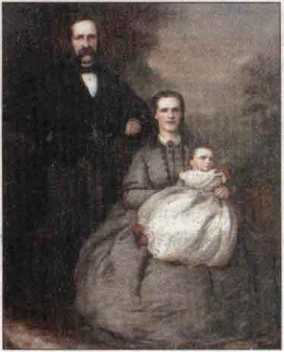 Mama kept her large family in order, and used a cane, if necessary'. With eight, ten, twelve or more chil- i dren, she was a very busy mother, for there were no vacuum cleaners, washing machines or electrical gad- i gets in the house. Tinned goods and foods prepared in I packets were unknown. Clothes were mostly made at ' home or at a dressmaker’s in the town. After she was thirty, Mama was considered quite middle-aged and often took to wearing a little lace cap in the house.
Mama kept her large family in order, and used a cane, if necessary'. With eight, ten, twelve or more chil- i dren, she was a very busy mother, for there were no vacuum cleaners, washing machines or electrical gad- i gets in the house. Tinned goods and foods prepared in I packets were unknown. Clothes were mostly made at ' home or at a dressmaker’s in the town. After she was thirty, Mama was considered quite middle-aged and often took to wearing a little lace cap in the house.
At the end of the day Papa took family prayers, when everyone, including the servants, knelt down in the dining room or study. He also led the family to church on Sunday. Sunday was a very solemn day and as little work as possible was done. No shops were open and there were certainly no amusements. Everyone put on their best clothes, which were usually stiff and uncomfortable.
On Sunday afternoons the family often went for a walk, but no games were allowed. Even picture books were forbidden on Sundays; Sunday reading included the Bible and certain books about the saints.
Although there were no radio sets, television, cinemas or motor cars, the Victorians did not find life dull. People worked longer hours, often twelve or fourteen hours a day. Amusements were simple and the family often gathered round the piano to sing the latest popular songs, or entertained each other by reciting or playing the piano. Public readings from Dickens and recitations were popular,
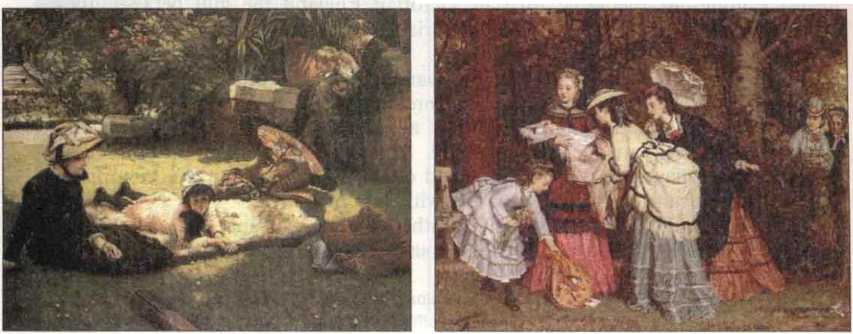
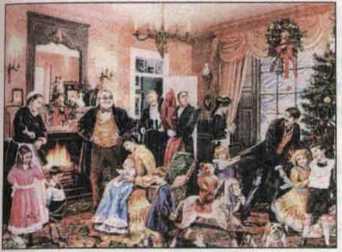
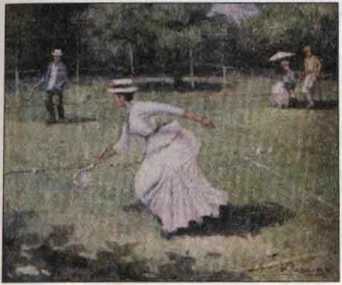
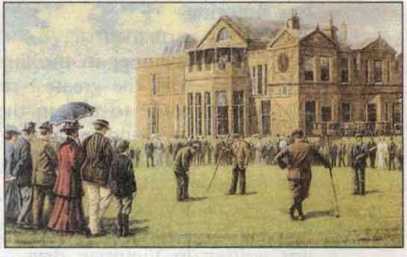
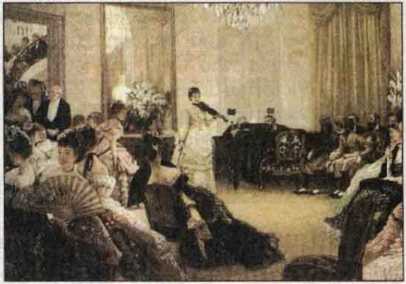
and drew large audiences. In London and the large towns the music halls were not considered quite respectable, but the theatre was sometimes visited.
Children very rarely went to any entertainment, except perhaps to the circus or to a pantomime1. They had their parties, with many of the games which are still played, like blind man’s buff. Children had plenty of books. Many of the best children’s stories were written in Victorian days: Alice in Wonderland, The Water Babies, Tom Brown's Schooldays, Black Beauty, Little Women and Treasure Island.
I b) Listen to the tape (No 19) and prepare an artistic reading of the text following the pattern given on the tape.
Look through the text in Ex. 44 and say:
who or what:
was marked by great change
made the UK the most powerful country in the world
was notorious
was always permanent
was the breadwinner in the family
was treated with the greatest respect
was not supposed to talk in the presence of adults
carved meat at Sunday dinner
was considered middle-aged at thirty
was forbidden on Sunday
was typical Sunday reading
was not considered quite respectable
was written in Victorian days
how these are characterized in the text:
the UK and Victorian time
people who lived in Victorian England
Victorian ideas
Victorian Papa
Victorian Mama
a typical Sunday
Victorian entertainments for children and grown-ups
Find in the text English equivalents for the following:
отмечен большими переменами
рост промышленности и торговли
расширение и усиление Британской империи
пропасть между богатыми и бедными
строгая мораль
браки отличались постоянством
образ жизни
довольствоваться немногими удовольствиями
борода или бакенбарды
разрезал на отдельные порции кусок мяса
пока с ними не заговорит взрослый
держала в порядке
приспособления
кружевной чепчик
читал молитву для всей семьи
книжки-раскраски
публичные чтения и декламация
торжественный день
жмурки
сокровище
1� middle class — the social class to which people belong, who are neither noble, very wealthy, nor work mainly with their hands. Usually business or professional people.

UNIT FOUR -«7






 Mama kept her large family in order, and used a cane, if necessary'. With eight, ten, twelve or more chil- i dren, she was a very busy mother, for there were no vacuum cleaners, washing machines or electrical gad- i gets in the house. Tinned goods and foods prepared in I packets were unknown. Clothes were mostly made at ' home or at a dressmaker’s in the town. After she was thirty, Mama was considered quite middle-aged and often took to wearing a little lace cap in the house.
Mama kept her large family in order, and used a cane, if necessary'. With eight, ten, twelve or more chil- i dren, she was a very busy mother, for there were no vacuum cleaners, washing machines or electrical gad- i gets in the house. Tinned goods and foods prepared in I packets were unknown. Clothes were mostly made at ' home or at a dressmaker’s in the town. After she was thirty, Mama was considered quite middle-aged and often took to wearing a little lace cap in the house.















